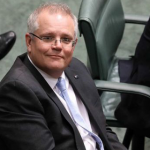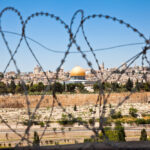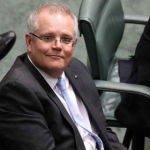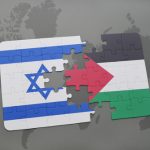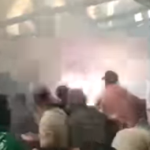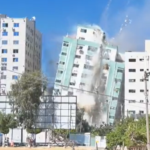Australia Is Complicit in Israel’s Atrocity Crimes: An Interview With ACIJ’s Rawan Arraf
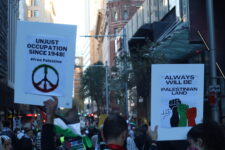
As the violence in Palestine-Israel continues to escalate, so too does the mainstream media’s focus on the rockets Hamas is launching out of Gaza, despite their impact being dwarfed by the force of the sophisticated weaponry being unleashed upon civilians by the sizable Israeli defence forces.
Much has been made of Hamas rockets being fired before the initial Israeli airstrikes, however, less is being said about Israeli police having attacked unarmed Palestinians in a mosque and elsewhere in Jerusalem’s Old City – with over 700 injured – prior to the cross border conflict erupting.
Since the fighting broke out on the evening of 3 May, 200 Palestinian civilians in Gaza have been killed, over 6,000 have been injured and at least 48,000 have been left homeless. In terms of the death toll in Israel, 12 people have been killed by rocket fire, with around 800 injured.
In an effort to suppress information regarding the situation in Gaza, Israel destroyed the building housing the offices of the Associated Press and Al Jazeera on Saturday. And it’s now threatened to destroy two Palestinian schools, which are to be used to house internally displaced persons.
Canberra’s problematic ties
In a 13 May joint statement, Palestinian and Australian human rights organisations called on the Morrison government to drop consideration of entering into a free trade agreement with Israel and review current trade cooperation in light of what’s unfolding in the Gaza Strip.
The statement outlines that the Department of Foreign Affairs and Trade (DFAT) is currently undertaking an inquiry into whether our government should strengthen its trade ties with Israel and potentially enter into a free trade agreement with the nation, which came into being in 1948.
The Palestinian Human Rights Organisations Council and the Australian Centre for International Justice (ACIJ) assert that the evidence that apartheid Israel is deriving economic benefits from subjugating the Palestinian people is stark and should warrant a halt to trade ties.
The ACIJ has previously condemned the Australian government for attempting to block the International Criminal Court from investigating international crimes allegedly perpetrated by Israel against Palestinians in the occupied territories. The ICC has ruled to proceed with the inquiry.
Upholding international law
Established in early 2019, the Australian Centre for International Justice is a not-for-profit legal centre advocating for the prosecution of international crimes, with the aim of bringing about justice for the survivors of war crimes and crimes against humanity.
Rawan Arraf is the executive director of the ACIJ. Prior to starting up the centre, the Palestinian Australian lawyer worked for the Refugee Advice and Casework Service (RACS), where she advocated on behalf of those in offshore detention, as well as on the citizenship claims of the stateless.
Sydney Criminal Lawyers spoke with Rawan Arraf about the bias in the mainstream media reporting on the conflict, the problematic trade ties that our government has with Israel, and the noticeable shift in wider support for the Palestinian cause.
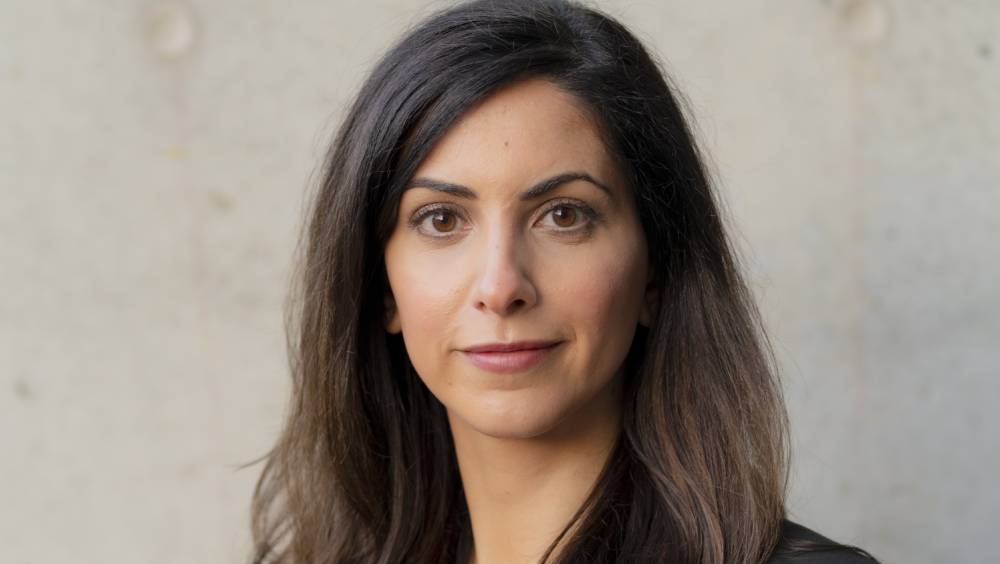
Firstly, since the current outbreak of violence in Palestine-Israel, close to 200 Palestinian civilians have been killed in Gaza, with over a quarter of that number being children.
There’s been a lot of criticism about the mainstream media’s focus on the rockets being fired out of Gaza by Hamas, rather than the Israeli airstrikes.
Rawan, can you elaborate upon why this reporting has been so problematic?
The Palestinian narrative often encounters this significant problem where Israel’s narrative and its justifications are constantly privileged over the Palestinian narrative.
There are several reasons for this. The first is that there’s a lack of curiosity on the part of the media to understand the issues better. There’s also an element of racism that discounts the value of Palestinian life and right to freedom from oppression.
But we also have to acknowledge that the Israel lobby is quite active in many western countries. It lobbies media organisations incessantly.
Part of the consequence of this harassment is that it makes journalists fearful about how they report on the issue. That’s fundamentally part of the problem.
The cross-border conflict began on the night of 3 May. On the morning prior, Israeli authorities attacked unarmed Palestinian worshipers inside the al-Aqsa mosque in the Old City of Jerusalem.
The police fired rubber bullets upon a morning prayer session, injuring 300 worshippers.
What sort of justification has been given for attacking unarmed people gathered in a mosque?
It’s the very typical Israeli justification for targeting Palestinian civilians, civilian property and essential infrastructure – blaming everything on Hamas. Of course, before Hamas existed there were other justifications used by Israel.
The broader point to make is that Israel sees any Palestinian as a threat to its settler colonial reality.
Australians should reflect on the power dynamics – and the asymmetry of power – this is fundamental to understanding the issue.
The basis of this conflict is that Israel has built a settler colonial society by subjugating and oppressing the Palestinian people.
If Australians understand this as the basis of where we are today, then everything else becomes much easier to understand and Israel’s justifications would be dismissed as misleading information.
On 15 May, Israeli forces destroyed the building that housed the Gaza offices of the Associated Press and Al Jazeera. Journalists and staff were given a one hour warning to vacate the building.
What does this development tell us about how the Netanyahu government is approaching the current escalation in violence?
It’s a reflection of Israel continuing to act with impunity. And that impunity is encouraged by the international community, including the Australian government.
As Palestinians have been saying for decades, the international community must act within their obligations under international law to hold Israel accountable for such crimes.
Whether that be through the mechanisms available to the international community through the UN Security Council – of course, we know what the problem is there – or through other effective measures such as through targeted sanctions regimes that countries can impose.
Australia has the ability to implement targeted sanctions against Israeli officials and entities that are directly involved or complicit in these ongoing crimes against the Palestinian people.
But we know that the Australian government is in lockstep with the Israeli government and provides cover and encouragement for its crimes. This, again, is part of the problem that needs to be remedied.
The Australian people have an opportunity to call their government to account for its unconditional support of Israel.
State and territory governments are also implicated through various agreements and cooperation programs with Israeli entities that are directly responsible for committing war crimes and crimes against humanity in Palestine.
In light of the unrest, the ACIJ and other Palestinian human rights organisations called on the Australian government to halt its consideration of entering into a proposed free trade agreement with Israel.
In your opinion, was consideration of this trade agreement problematic prior to the current escalation. And how would such an arrangement impact Palestinians?
The Australian government’s trade cooperation with Israel needs to be urgently reviewed, because it is complicit in Israel’s crimes through numerous trade and defence cooperation agreements.
These agreements need to be suspended, because they breach our international obligations as a third state under international law to ensure that we’re not encouraging illegal situations.
This includes Israel’s military occupation and the regime of apartheid implemented against the Palestinian people.
The impacts of these agreements on the Palestinian people are grave. We know that Israel exploits its occupation through its appropriation of Palestinian land and its extensive and illegal settlement enterprise.
It exploits Palestinian’ natural resources for its own economic benefit. These are all crimes under international law, and Australia’s criminal code.
This is all done at the expense of the Palestinian people, while Palestinian economic growth is continually stunted by Israeli crimes and actions daily.
This should not be rewarded. These crimes must be called out. Australia cannot be encouraging them by entering into free trade with Israel.
We set out ten recommendations the Australian government must undertake in order to comply with its own obligations under international law to not encourage illegal situations and deprive Palestinian people their fundamental human rights.
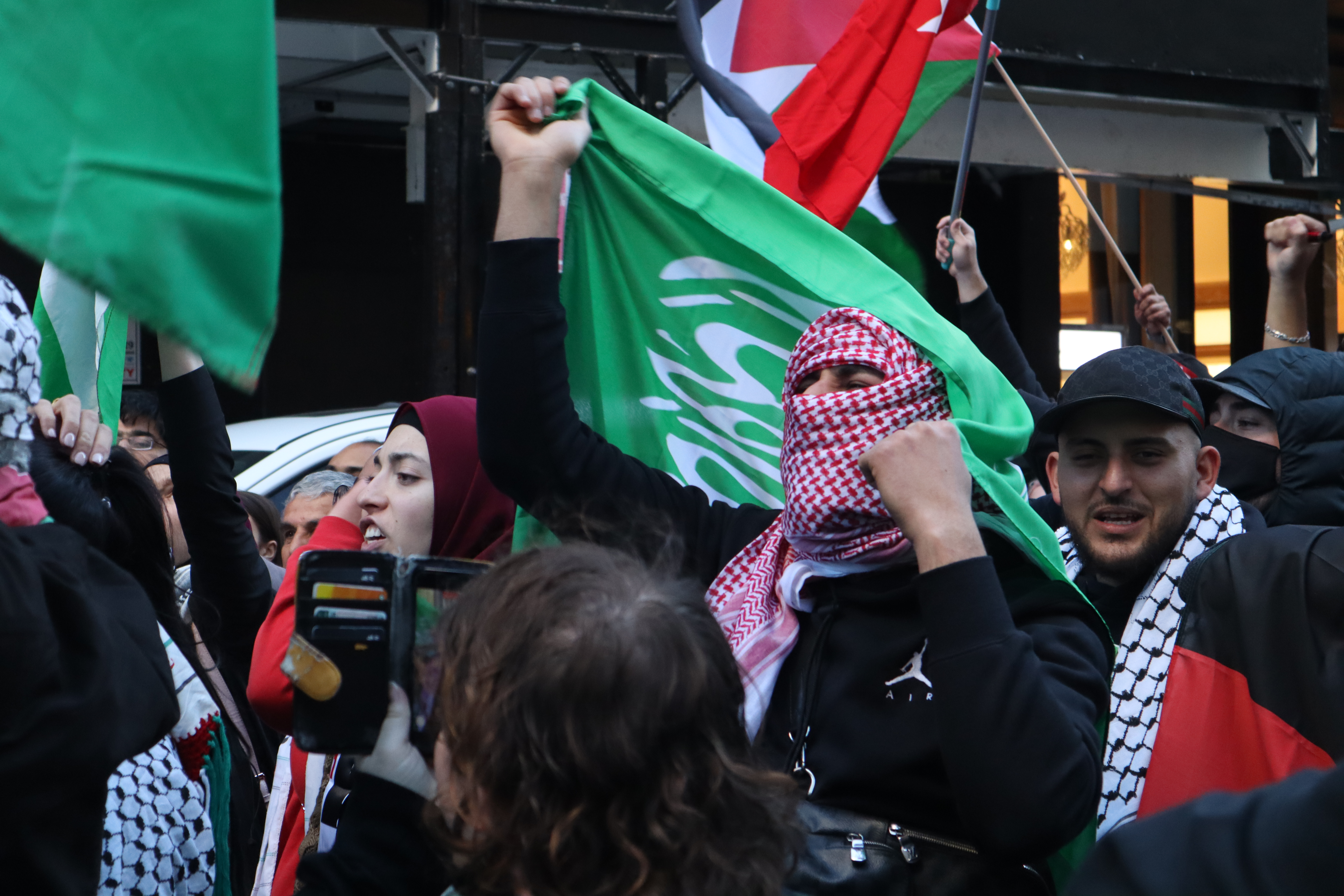
Last Saturday, thousands turned out in support of the Palestinian people at a Sydney rally. This was echoed nationwide, as well as around the globe.
Some have suggested that while the mainstream media continues to reflect a bias towards Israel, there has been a grassroots shift in support towards the Palestinian cause.
As a Palestinian-Australian, would you say a change has occurred in how the broader public are perceiving what’s unfolding in Palestine-Israel?
Yes. In speaking with Palestinians and their supporters around the world, we have seen a dramatic shift, and that could be related to a number of reasons.
We have seen a global reckoning with the structural injustices related to race and power, reflected in the Black Lives Matter movement in the US, but also here in Australia, and a growing movement for justice for First Nations people and Aboriginal Lives Matter.
This has helped people understand the basis for Palestinian oppression, under Israel’s settler colonial regime.
When you are able to view the issue in this context, then it becomes easier to understand what Israel is doing to the Palestinian people and has been doing for the last seven decades.
The Australian Centre for International Justice advocates for the prosecution of atrocity crimes. Looking at what’s been taking place over the last week in Palestine through an international crime lens, how would you sum up what’s taking place?
In the occupied West Bank what we are seeing is systematic human rights abuses, such as the ethnic cleansing of the Sheik Jarrah residents.
These acts do not only amount to war crimes, but also encompass acts which contribute to the crimes against humanity of apartheid and persecution.
We recently saw Human Rights Watch issue a landmark report that analyses what’s happening in the occupied Palestinian territory as acts amounting to the commission of the crimes against humanity of apartheid and persecution.
But what we are also seeing again is the Israeli campaign of flattening Gaza. Every few years, Israel wages intense warfare from the sky against defenceless people.
We are witnessing serious and numerous breaches of international humanitarian law, which amount to war crimes. It’s important to note that these are also offences under Australia’s criminal code.
There is the targeting of the civilian population and property in Gaza, vital civilian infrastructure, the targeting of media organisations, health clinics and even roads that lead to hospitals.
This is part and parcel of Israel’s decades of continuing crimes against the Palestinian people.
And lastly, Australian PM Scott Morrison said last Friday that Israel has a right to defend itself. Foreign Minister Marise Payne called on all parties to refrain from violence.
Rawan, what’s your take on how the Morrison government is responding to the crisis? And in your opinion, how should it react?
Unfortunately, the Morrison government has been the most pro-Israeli government that we have seen in Australian history.
This was reflected last year, when the Australian government intervened at the International Criminal Court to prevent an investigation into Israeli war crimes and crimes against humanity from taking place.
Australia acted on the encouragement of the Israeli government. And we know that because DFAT acknowledged this at Senate Estimates last year.
The Australian government acted on the request of the Israeli government to intervene and stop an investigation into serious crimes from happening. That’s appalling.
It shows a double standard towards the human rights of the Palestinian people and their right to seek justice and accountability for the crimes against them.
As I said earlier, it is a reflection of Australia’s encouragement of Israel’s impunity for ongoing crimes against Palestinians.
To go back to your question, what the Australian government should be doing is condemning Israel for its grave abuses and taking action against Israel so that it would stop its ongoing daily crimes against the Palestinian people.
The Morrison government is doing the opposite. And I would argue that the majority of Australians wouldn’t support the Morrison government’s position in its unconditional support to Israel at the expense of Palestinian rights.


